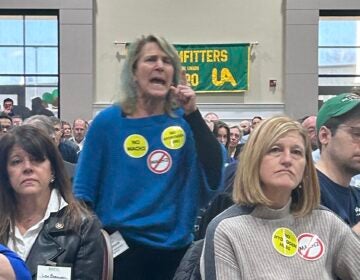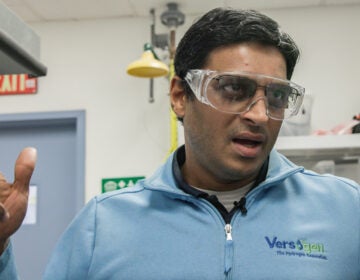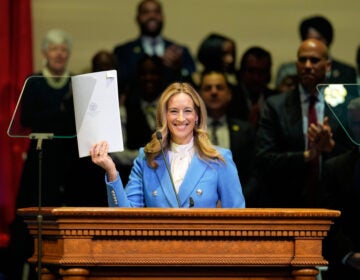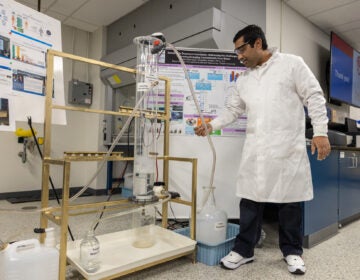Hydrogen-related businesses pay to network. Environmental justice advocates say those doors should be open to the public
MACH2 leaders say the business networking events don’t preclude community engagement. Activists say they’re an example of exclusivity.
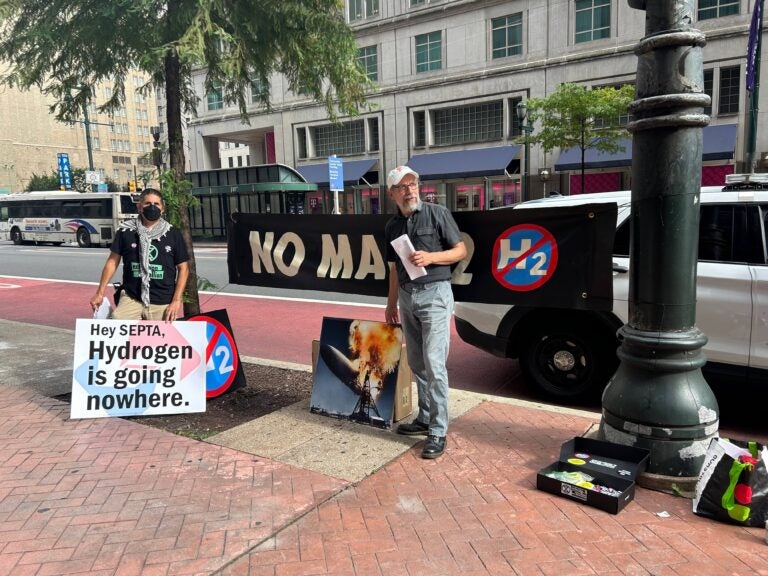
Climate activists with Extinction Rebellion Philadelphia picket outside a paid networking event for hydrogen-related businesses organized by the leaders of the MACH2 hydrogen hub. (Sophia Schmidt/WHYY)
From Philly and the Pa. suburbs to South Jersey and Delaware, what would you like WHYY News to cover? Let us know!
A few dozen people in business attire gathered over bagels and coffee at the SEPTA headquarters in Philadelphia on Tuesday, eager to promote and discuss the proposed Mid-Atlantic Clean Hydrogen Hub, or MACH2.
Outside the networking event, however, a handful of environmental activists wary of the project held signs reading, “Hydrogen is going nowhere” and “No MACH2.”
“You have to pay to get into the meeting,” said Eric Moss, an activist with the activist group Extinction Rebellion. “This is a closed-door meeting.”
To some, the event contradicted the “culture of collaboration” and “shared-decision-making with stakeholder communities” MACH2 leaders promised in their application for federal money.
“They are exclusionary,” said Tracy Carluccio, deputy director of the Delaware Riverkeeper Network, who paid to get in. “They are keeping the public out.”
The Mid-Atlantic Clean Hydrogen Hub, known as MACH2, is a proposed network of projects, subsidized with federal money, that would produce, process and use hydrogen in place of planet-warming fossil fuels at various locations throughout southeastern Pennsylvania, South Jersey and Delaware.
It’s one of seven hubs across the country that the U.S. Department of Energy announced last year could receive a total of $7 billion from the Bipartisan Infrastructure Law. MACH2 is set to receive $750 million but is still in negotiations with the federal government over the award. A planned hub in western Pennsylvania, West Virginia and Ohio, ARCH2, finalized its agreement this week.
MACH2 officials said the series of monthly networking events are geared specifically to the business community and are not a replacement for broader community engagement. They said no decisions are made during these meet-ups — beyond possible private business-to-business deals — and no new information about the hub is shared.
Boosters say MACH2 would supply a fuel source free of climate pollution to hard-to-electrify industries — like steel and chemical manufacturing — while leveraging the region’s old fossil fuel infrastructure to create thousands of new jobs.
Burning hydrogen does not release planet-warming emissions. But when fossil fuels are used to make hydrogen, the process contributes to climate change.
Currently, almost all hydrogen produced in the U.S. is made using natural gas.
But companies producing hydrogen as part of MACH2 would use mostly solar or wind energy, officials say. A smaller amount would be created using nuclear power or biogas.
The broad outlines of the projects that would make up the hub — such as generation of hydrogen using nuclear power at the Salem-Hope Creek complex and use of hydrogen to power boilers at the Monroe Energy refinery near Marcus Hook — are “pretty well set,” said Manny Citron, vice president for partnership and community engagement with MACH2, the group coordinating the hub.
The first phase of hub planning, which could kick off as early as next month once the award agreement is signed, will include more detailed planning of the projects, community engagement and some engineering, officials say. An important part of winning that award are stringent requirements by the DOE for public engagement that the agency says must go beyond one-way communication of settled plans.
But critics say hub officials are already failing to be transparent and to meaningfully engage with communities where elements of the hub could be built. It’s a similar criticism that’s been lobbed at other hubs across the country, including one in California that advocates accuse of secrecy and leaving potentially impacted communities out of planning — despite a promise from the Biden administration that 40% of the benefits from the hubs will flow to disadvantaged communities that have faced underinvestment and been overburdened by pollution.
“From the beginning of MACH2, environmental justice has not been invited to the table,” said Dora Williams, an organizer with Delaware Concerned Residents of Environmental Justice who lives along Delaware’s Route 9 corridor, where the EPA has said industrial pollution raises residents’ risk of cancer. “We were not invited to the table for decision-making.”
Networking events to build out the Mid-Atlantic’s hydrogen ‘ecosystem’
Tuesday’s event was the second in a series of monthly networking meet-ups hosted by MACH2. Attendees were required to pay $25 to $50 to enter.
MACH2 officials say the goal of the events is to build out the ecosystem of businesses that will form supply chains connected to the hub.
“This is a networking opportunity for people who are engaged in the energy field, or the labor field, or the workforce field,” Citron said. “This is an opportunity for people who are players in the energy field and specifically the hydrogen field to get a chance to meet each other in a way they otherwise wouldn’t.”
Andrew Cottone launched First State Hydrogen, Inc., a startup he hopes will eventually produce green hydrogen as one of the MACH2 partners that will receive some of the hub’s funding. He attended Tuesday’s meet-up to connect with other businesses and learn information he can bring back to his community in Delaware.
“We’re talking to the unions, we’re talking with other companies who can advance our cause, we’re talking with trucking companies,” he said. “I want to be part of the dialogue.”
Paul Kiernan, who works for Maryland-based Teledyne Energy Systems, said he’d given away all his business cards by the end of the networking event. The business manufactures the electrolysis systems a company like Cottone’s could use to make green hydrogen.
“First [connection] off the bat was a home run,” Kiernan said. “I’ve got to meet a lot of interesting folks, and they have questions about electrolysis that I’ve been able to answer.”
Attendees also heard a presentation from SEPTA officials about a hydrogen fuel cell bus pilot project starting this fall. SEPTA’s use of hydrogen-powered vehicles is part of the MACH2 proposal.
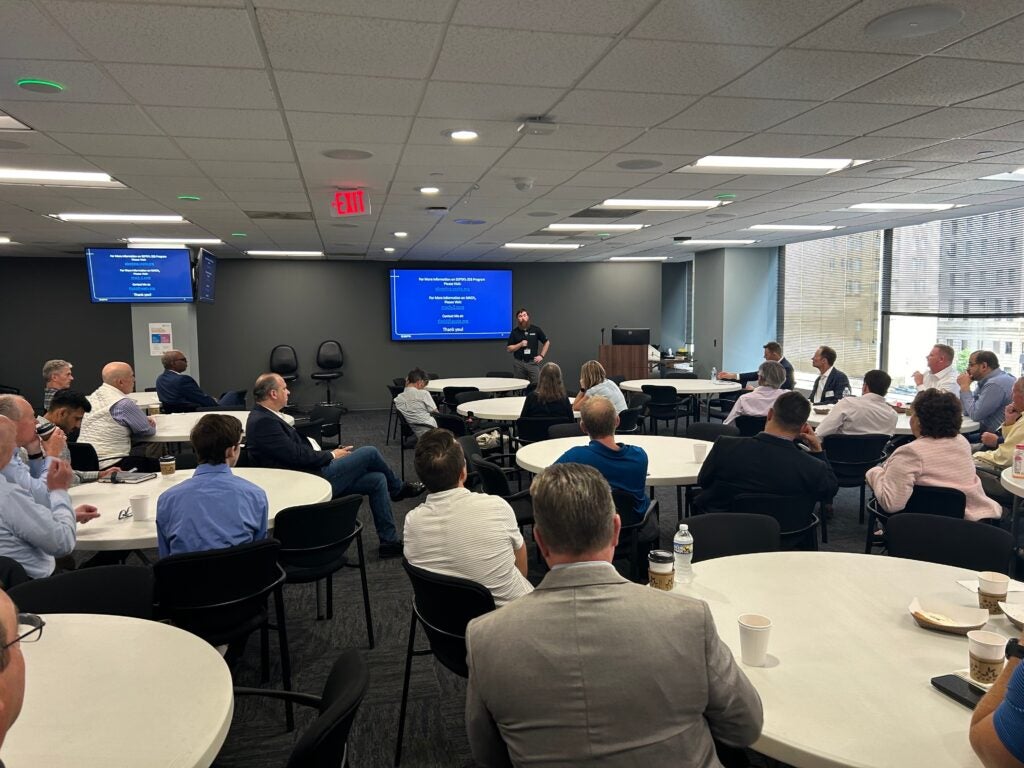
MACH2 has also launched a membership program, with tiered membership levels costing $2,500 to $10,000. Members get free access to educational webinars and complimentary registrations to an “annual MACH2 Hydrogen Conference,” as well as access to members-only events and a members-only online portal, according to the hub website.
Matt Krayton, a contracted spokesperson with MACH2, said the purpose of the membership program is to provide a venue for business-to-business connections related to the hub — for example, between a solar developer and a hydrogen producer.
He said the funds generated through the paid memberships will go to support the operation of the hub’s organizing body.
‘This disrespect is real’
Zulene Mayfield, who leads the environmental justice group Chester Residents Concerned for Quality Living, was upset to learn about the MACH2 networking meet-ups — which she said her group was not invited to.
“You all are trying to make all of these connections with these businesses, with the unions, with the politicians. Where is the say of the people who are going to be mostly impacted?” she said. “We have requested a seat at the table, and still you’re cutting the communities out of this … This disrespect is real.”
Citron said MACH2 leadership has met with the Pennsylvania Department of Environmental Protection’s Citizens Advisory Council, several environmental justice activists and environmental advocacy groups — including Mayfield’s.
Citron said once Phase 1 of hub planning begins, residents near hub projects will get a say in details such as where on a property hydrogen-producing equipment is located.
“The location of most of the projects is decided,” he said. “What is not decided is the specific layout of what happens at those locations. And that is where there is the community opportunity — the requirement for community engagement — and the opportunity for two-way communication.”
Mayfield, who for years has led battles against the Reworld (formerly Covanta) trash incinerator in Chester, said her group has been told that community engagement around the hydrogen hub has not begun in earnest yet because the projects are not set in stone. But she fears communities won’t be included until the projects are “shovel-ready.”
“What better time frame to pull a community in [than] when you’re formulating this stuff?” she said. “[Otherwise,] the community gets to the station, and the train is already gone.”
Citron defended the decision to delay broader community engagement until later in the planning process as an effort to avoid presenting half-baked plans and asking residents to engage with ideas that may never pan out.
“We want to be … certain about the information we put out … to make sure that communities have the correct information for them to make decisions on,” he said.
After MACH2 secures its DOE agreement, it plans to schedule a public webinar this fall and offer individual briefings for local community groups upon request. Each individual hub project will have its own community advisory panel, Citron said.
“There will be a lot of us communicating and engaging on the more public side coming very shortly,” he said.

Get daily updates from WHYY News!
WHYY is your source for fact-based, in-depth journalism and information. As a nonprofit organization, we rely on financial support from readers like you. Please give today.



